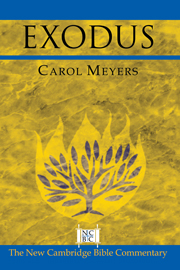Book contents
- Frontmatter
- Contents
- List of Tables
- List of Supplementary Sections
- Preface
- A Word about Citations
- List of Abbreviations
- I INTRODUCTION
- II SUGGESTED READINGS ON EXODUS
- III COMMENTARY PART I. ISRAEL IN EGYPT – EXODUS 1–15:21
- IV COMMENTARY PART II. SINAI AND COVENANT – EXODUS 15:22–24:18
- V COMMENTARY PART III. SANCTUARY AND NEW COVENANT – EXODUS 25:1–40:38
- Biblical and Extrabiblical Texts Index
- Hebrew Terms Index
- Author Index
- Subject Index
Preface
Published online by Cambridge University Press: 05 June 2012
- Frontmatter
- Contents
- List of Tables
- List of Supplementary Sections
- Preface
- A Word about Citations
- List of Abbreviations
- I INTRODUCTION
- II SUGGESTED READINGS ON EXODUS
- III COMMENTARY PART I. ISRAEL IN EGYPT – EXODUS 1–15:21
- IV COMMENTARY PART II. SINAI AND COVENANT – EXODUS 15:22–24:18
- V COMMENTARY PART III. SANCTUARY AND NEW COVENANT – EXODUS 25:1–40:38
- Biblical and Extrabiblical Texts Index
- Hebrew Terms Index
- Author Index
- Subject Index
Summary
Of all the books in the Hebrew Bible, Exodus perhaps has had the greatest impact beyond the ancient community in which it took shape. The account of escape from oppression has become a great narrative of hope for peoples all over the world. The tale of courageous prophetic activity often has served as a model for struggling community leaders. The values embodied in the legal traditions are reflected in the law codes of many countries. The attention to the physical setting as well as the moral issues involved in the service of God reverberates in houses of worship everywhere. The establishment of a final form of Exodus as part of Hebrew scripture was both the end product of a long process of tradition formation and, at the same time, part of the beginning of the book's profound and enduring role in Christianity and Islam as well as Judaism.
Although it is not the first book in the Bible, Exodus arguably is the most important. It presents the defining features of Israel's identity, as it took shape by the late biblical period. First and foremost are memories of a past marked by persecution and hard-won, if not miraculous, escape. As it is recounted in Exodus, this past is inextricably linked with a theophany on a national level at Sinai, the initiation of a binding covenant with the god whose name is revealed to Moses, and the establishment of community life and guidelines for sustaining it.
- Type
- Chapter
- Information
- Exodus , pp. xv - xviiiPublisher: Cambridge University PressPrint publication year: 2005



